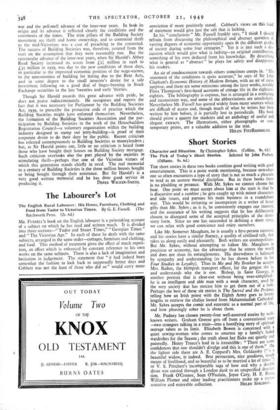Short Stories
Character and Situation. By Christopher Sykes. (Collins. 8s. 6d.) The Pick of Today's Short Stories. Selected by John Pudney. (Odhams. 8s. 6d.) THE short stories in these two books combine good writing with good entertainment. This is a point worth mentioning, because nowadays one so often encounters a type of story that is not so much a pleasure to read as an austere mental discipline. But in these books there is no plodding or penance. With Mr. Sykes we cannot choose but hear. One point we must accept about him at the start is that he is discursive and a rambler ; he gets caught up with minor characters and side issues, and pursues his main business in a roundabout way. This would be irritating or incompetent in a writer of lesser gifts than Mr. Sykes ; as it is, he consistently engages our interest, and the assurance of his writing suggests that he has deliberately chosen to disregard some of the accepted principles of the short- story form. Since no one has succeeded in defining a short story, we can relax with good conscience and enjoy ourselves.
Like Mr. Somerset Maugham, he is usually a first-person narrator, and his stories have a similar .fluency, a quality of civilised talk, that takes us along easily and pleasantly. Both writers are cosmopolitans. But Mr. Sykes, without attempting to follow Mr. Maugham in precision or economy, has the advantage that he enters the world and does not shun its entanglements. His shrewdness is balanced by sympathy and understanding (as he has shown before in his Four Studies in Loyalty). Thus in Me and My Brother he accepts Mrs. Raikes, the blimpish transport officer, for the gorgon she is, and understands why she is one. Bishop, in Saint George, is another portrait that is clear-cut without being over-simplified: he is an intelligent and able man with a weak character, used by the very society that has outcast him to get them out of a hole. Perhaps the best of these six stories is The Sacred and the Profane, telling how an Irish priest with the Eighth Army goes to heroic lengths to retrieve the chalice looted from Maharnmadieh Cathedral. Mr. Sykes accepts the comic and eccentric as a normal part of life, and how pleasingly sober he is about them.
Mr. Pudney has chosen twenty-four well-assorted stories by well- known writers. Graham Greene gets off from a conventional start —two strangers talking in a train—into a horrifying story of spiritual outrage taken to its limit. Elizabeth Bowen is concerned with quiet sewing-woman who comes to smarten up a family's faded wardrobes for the Season the truth about her flicks out quietly and pointedly. Henry Treece's lead in is irresistible: "There are some confidences that one shouldn't divulge and this is one of them." On the lighter side there are A. E. Coppard's Mrs. Goldansky (" is a beautiful widow, is indeed. Best persuasion, nice goodness, much means of livelihood, and so beautiful as to be married a lot of times ) or V. S. Pritchett's incomparable saga of how and why a double divan was carried through a London dusk to an unspecified destina- tion. Frank O'Connor, Sean O'Faolain, Joyce Cary, H. E. Bates, William Plomer and other leading practitioners make up a repre- sentative and enjoyable collection. HELEN SPALDING.


































 Previous page
Previous page